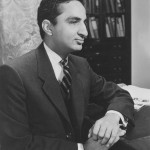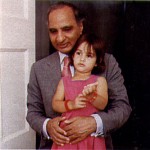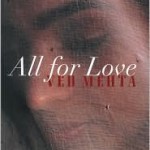Mehta Broadens, Challenges Cultural Perspectives
“One need only glance at the credentials of Ved Mehta, who joined the teaching staff at Williams for this semester as an Arnold Bernhard Visiting Professor of English and history, to see that Williams has gained a gifted mind. A staff writer for The New Yorker magazine between 1961 and 1993, Mehta has written on philosophy, religion, history, linguistics, history, his family and his childhood. He has won extensive writing honors, including two Guggenheim Fellowships, the MacArthur Prize Fellowship, the New York City Mayor’s Liberty Medal and the New York Public Library Lion Medal.
Mehta has published 19 books (both fiction and non-fiction), seven of which are volumes of his autobiography. Mehta’s accomplishments are not only in print, moreover. The television documentary film Mehta both wrote and narrated, “Chachaji: My Poor Relation,” won the DuPont Columbia Award for Excellence in Broadcast Journalism in 1978.
A lifelong commitment to writing
Despite these impressive accomplishments, however, Mehta does not proclaim to have mastered the art of writing. “I don’t call myself a ‘writer’ because I feel that writing is a lifetime apprenticeship; each time you finish a book, you have to start all over. That’s the terrifying part about writing. You can’t rest on your laurels—no matter how good you are, you can always read a page of Chekov or Shakespeare or Proust, and be put in your place,” Mehta explained.
When asked about writers that have most influenced him, Mehta replied, “I am a very dilettanteish reader. I’ve read a lot of Proust, Chekov, Shakespeare, Milton, Conrad, Nabokov and John Updike. I’m very much a traditionalist. I feel my world would be poorer if l didn’t have every one of those writers.”
Having taught English and history at several other academic institutions, including Bard, Sara Lawrence, New York University, and Yale, Mehta wrote to President Oakley for a possible teaching position after receiving an honorary degree from Williams in 1986. After being informed that he had been appointed Arnold Bernhard Visiting Professor, Mehta decided to begin teaching in the spring semester of this year.
One of the two classes that Mehta is teaching this semester is History 276, “India since Independence, 1947 – present.” Mehta feels that courses on Indian history are crucial in today’s world. “One out of six people alive today is an Indian. For historical reasons, most good colleges have had courses about China but not India,” Mehta said.
“I have felt [studies about India] are a need. I would like to teach an earlier period [of Indian history] but there is not much interest. The culture is changing now. There are streams of Asian cultures coming into Western culture. What I do in my seminar is to try to introduce students to India since 1947. I start out by teaching about political narrative, and then branch out into the cultural, economic and social aspects of India,” Mehta continued.
“I am an amalgam”
While Mehta’s Indian heritage is an important aspect of his self-identity, he is a product of several cultures. In his speech last April at Weston Language Center, entitled “Continents of Exile: Autobiography as a Metaphor,” Mehta spoke about being a part of many worlds. “I am an amalgam of five cultures: Indian, British, American, Blind, and The New Yorker,” Mehta said. “Before I started writing my books, I thought they crippled me, but when I stared, I found that they in fact enriched me. I’ve been able to work myself out of the conflicts that exist [between the five cultures]. I found a resolution in writing.”
It is in his autobiographies that Mehta combines elements of all his different “cultures.” The second class Mehta is currently teaching is English 386, Writing Autobiography. When asked to explain his apparent fondness for the autobiography as a genre of writing, Mehta said, “I think that [the autobiography] is a contemporary form of writing suited to our period because it’s between fiction and non-fiction. One uses the same techniques that one would use for fiction, and yet it is non-fiction.”
Each volume of Mehta’s autobiographies revolves around a central theme or metaphor, such as education or blindness. “The idea is not to tell my life,” Mehta said, “but to recreate the lives of others…. I’m just the narrator. They’re written like novels. Each is separated, yet connected because they’ve all been a part of my life in one way or another.”
In the lecture he gave last year at Williams, Mehta called himself “an unremarkable man writing about unremarkable people.” He continued, “All I’m trying to do is tell a story not of one life, but of many lives—and through these stories, to say something that’s universal.”
A New Yorker veteran
Mehta was a staff writer for The New Yorker magazine between 1961 and 1993; he speaks with fondness about his days writing for the magazine. “The New Yorker, at least for me, was a place where I could write my own ticket to freedom…. Nobody ever told me what I should write about. I wrote about whatever I wanted to write, and if they published it, I got paid,” Mehta said. “It was a unique magazine in the sense that it really was just a loose association of writers and editors who pursued their own interests, so that something unexpected emerged every week. We didn’t worry then about who would read the magazine or what the market wanted,” Mehta reminisced. “Now,” Mehta continued, “all this has changed. There have been dramatic changes in the publishing world, in the marketplace, and in the personnel at The New Yorker.” Mehta cited television and computers as important factors that have helped to bring about this change in society.




